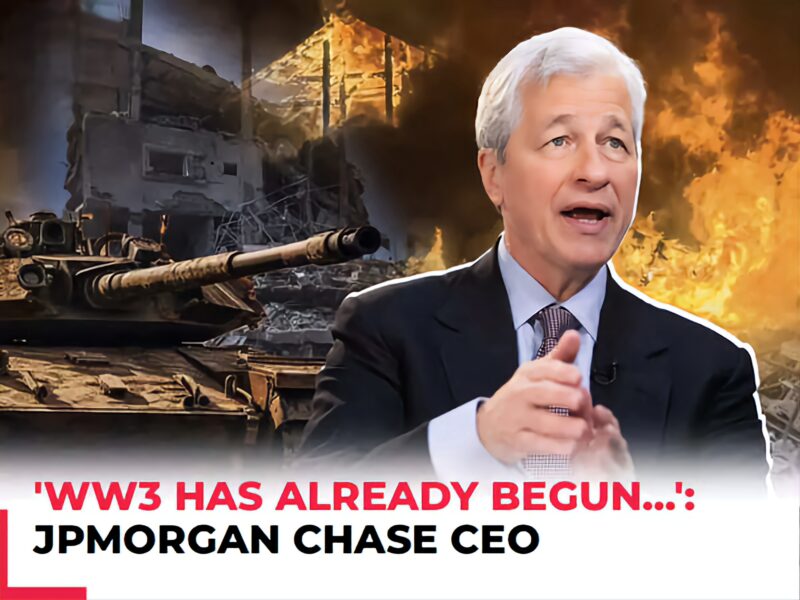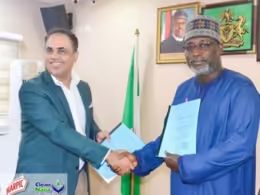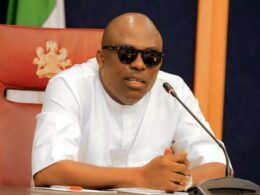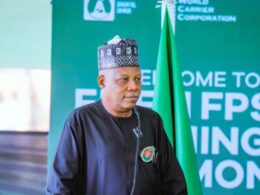JP Morgan CEO warns global conflicts signal a new era of heightened risk, calling nuclear proliferation “The beginning Of World War 3”
In a stark warning, JP Morgan CEO Jamie Dimon declared that the world might already be in the early stages of World War III, pointing to escalating conflicts in Ukraine and the Middle East. Speaking at the Institute of International Finance, Dimon underscored the dangers posed by a coalition of powers like Russia, Iran, North Korea, and China—a grouping he referred to as an “evil axis.”
Dimon emphasized the urgency of the situation, asserting that global tensions aren’t years away from escalation but rather are happening now. “They’re not talking about waiting 20 years. And so the risk of this is extraordinary if you read history,” he said.
Nuclear Threat Looms Larger Than Climate Change, Says Dimon
Dimon went on to outline his concerns over nuclear proliferation, claiming it as humanity’s “biggest risk” over even climate change. He highlighted Russia’s nuclear threats as especially alarming, given the nation’s implied willingness to leverage its arsenal if its military faced potential defeat.
“We’ve never had a situation where a man is threatening nuclear blackmail,” Dimon said. “If that doesn’t scare you, it should.”
According to Dimon, the potential spread of nuclear technology to more nations could result in catastrophic scenarios, including the destruction of entire cities. He cautioned that it was only “a matter of time” before nuclear events could impact major cities globally, urging the U.S. to take a proactive stance in global affairs to prevent disaster.
Expert Opinion: “Still Time to Avoid WWIII,” Says Ohio State Professor
While Dimon’s statements drew widespread attention, Paul Beck, a political science professor at Ohio State University, offered a more cautious perspective. Though he acknowledged that global tensions are rising, he stopped short of calling World War III inevitable. “Maybe it is the beginning of WWIII, though I am not yet ready to concede to that milestone,” Beck told Newsweek.
Beck noted that while U.S.-Russia relations have been tense since the Cold War’s end in 1991, the current geopolitical climate—particularly conflicts involving Ukraine, Iran, and Chinese threats to Taiwan—has rekindled Cold War-era concerns.
Trump Weighs In: “Global Catastrophe” on the Horizon
Dimon’s remarks echo recent comments from former President Donald Trump, who warned last month of a potential “global catastrophe” after escalating missile attacks from Iran on Israel. Speaking at a rally in Wisconsin, Trump said he had long predicted the possibility of a third world war, citing Iran’s aggressive posture in the Middle East.
“When I was president, Iran was in total check,” Trump said,
referencing the sanctions his administration imposed and its exit from a nuclear deal signed under President Obama. “But ever since, Iran has been exporting terror all over the world, and it’s been just unraveling.”
The Road Ahead: Caution and Clarity Needed
Dimon concluded with a call for clear-headed thinking, stressing that the U.S. should not rely on global conflicts to resolve themselves. “We can’t take the chance this will resolve itself. We have to make sure that we are involved in doing the right things to get it resolved properly,” he said, warning that further instability could shock the global system.
With rising nuclear and geopolitical threats, Dimon’s comments are a stark reminder of the high stakes facing international leaders today. While experts like Beck advise restraint, the urgency in Dimon’s tone suggests a need for vigilance and proactive measures to avoid disaster.










Join our Channel...